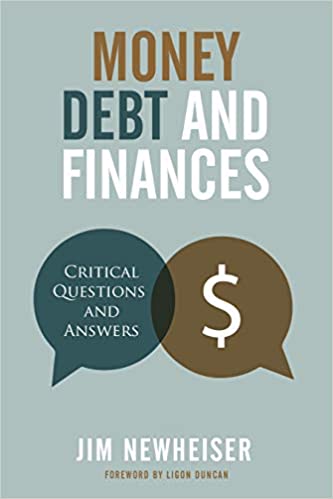An Author Interview from Books At a Glance
Greetings! I’m Fred Zaspel, and welcome to another Author Interview here at Books At a Glance.
Today we are talking to Dr. Jim Newheiser about his very practical and much-needed new book,
Money and Finances: Critical Questions and Answers.
Jim, welcome back, and congratulations on a very helpful book.
Newheiser:
Thank you very much, Fred. This was my COVID project. When the world shut down, I was finally able to finish it.
Zaspel:
Tell us what your book is all about. And with that, what is the contribution you hope to make? And who is your intended audience?
Newheiser:
I have a background in finance. My first several years of my career was doing computer financing. I worked overseas in my twenties. I learned a lot of financial mistakes that I or my colleagues were making. Now the last thirty something years my focus has been being a biblical counselor and pastor. I tried to bring together my knowledge and experience on the practical side but also wanted it to be robust theologically. It is intended to be a practical and most helpful format. It is a question, answer format. It deals with forty-one different questions and can be used as a reference. For example, about insurance or making a budget work. It also can be read straight through to get an overview of how the Bible addresses the ordinary questions that people have.
I wanted to give a summary of what was really in my heart. There are people like Dave Ramsey who have a lot of practical advice. They are extremely popular but would be lighter in terms of scriptural explanation. I would like to be the biblically and theologically robust addition to Dave Ramsey. I used the analogy of Jim Dobson on practical parenting and then Ted Tripp wrote Shepherding A Child’s Heart, a more biblically robust example of parenting. Practical, wise but also really rooted in Scripture using texts in their context. We need to theologically understand these practical issues. Ordinary people need the wisdom; I try to write it very simply, so it is readable. The answers are rooted in Scripture. I hope pastors and counselors will be able to use it as they are trying to help people.
Zaspel:
Give us a brief fly-over of your book so our listeners can know what to expect.
Newheiser:
Initially, I deal with general principles of money. How God has established the world as a productive place and has given wisdom going back 1000s of years about financial matters. The Bible gives us wisdom in terms of how we are to regard money spiritually. It is not evil but important to fulfill responsibilities to God. I theoretically address the role finance plays in our lives and the spiritual dangers as well. The other sections are how do you gain money, legitimately. Fundamentally we are to work hard and smart. Proverbs describes the hard worker. I address questionable ways of making money. I address budgeting, giving, and debt. Individual, church, and government debt is a big problem today. The last section is preparing for the future. What are appropriate ways a believer should plan in terms of savings, insurance, retirement, wills, and trusts. I give a fly-over of those issues to make people aware. I include budget making and sheets. We have links online where you can create your own budget.
Zaspel:
Give us a sense of what the Bible has to say about money and finances. How often does it address the issue, and what topics are most prominent?
Newheiser:
The Bible is comprehensive in how it addresses finances. In Genesis, we learn we were put here to cultivate and make it productive. Sin made it difficult. God blessing Abram through his diligence, he gave them wealth in the Old Covenant. Deuteronomy, God promised prosperity with the faithfulness of his people. Proverbs is a treasure house of practical wisdom about working, saving, and debt.
Jesus and the parables that revolve around money, is illustrating a spiritual principle. They contain their own nuggets of wisdom. Jesus explains the good commandment includes providing for your family and giving the right or wrong way. First Timothy 5 tells us if someone does not provide for his family, he is worse than an infidel. Money is like fire or sex. In the proper place, it can be powerful or good. If money is in the improper place, a great deal of damage can be done. The Bible gives us timeless, comprehensive wisdom in how we can honor the Lord in this area of our lives.
Zaspel:
It seems to be difficult, the topic of money in preaching. It is a common topic that comes up in Scripture. It is an important part of discipleship.
Newheiser:
One benefit of preaching through books of the Bible is that it will come up naturally. One area preachers talk about money is in giving, which does not come up all that much. It is awkward to talk about. I did a series on Proverbs, gathering the wisdom of Proverbs on this topic. There are several messages of wisdom in Proverbs alone on money.
Zaspel:
You have a lot of experience in counseling – what money/finance-related problems are the most common?
Newheiser:
We had a counseling center where we did counseling for the community. We often got people to come because we offer free counseling if they let observers learn while we counseled them. One of most counselees’ problems are usually money. Recently my wife and I counseled a couple who lost their home because of careless spending. They got themselves too far behind. We first dealt with the heart issues that led to the unwise behavior. Rather than rushing to make a budget or a system, we addressed the spiritual issues behind that. Relationally we looked at their responsibilities. They needed to get right with God and with each other. We worked together to address the financial problems. Sometimes it is the central issue because people are in crisis. We help them with a budget. Sometimes the money problems are symptoms of other problems that need to be addressed where you can begin to solve the money problems.
We are in a culture where delayed gratification is no longer part of life. My parents grew up in the depression. You saved for things and held back. Now, in the political culture, they spend money they do not have. The culture as a whole is: you buy the house, the car, the clothes, eat out, and live the lifestyle you think you deserve. We assume it is all going to work out. It is another way Christians are counter-cultural. We help needy family members; we have commitments different than the world. This includes not comparing to what other people have. Sometimes it is frustrating because we are being responsible and irresponsible people are being bailed out at your expense. We must act wisely and think not just of the short term.
Zaspel:
What are some broad biblical principles that should guide our thinking with regard to money, giving, and pursuing the interests of the gospel?
Newheiser:
One would be to get a sense of purpose in vocation, in whatever we are doing. It is not just pastors and missionaries who are important. Every vocation is one in which we can honor God. To strive for excellence, productivity, and for the glory of God. We are not just wanting the nice things to have a nice life. We want to use the gifts God has given us to fulfill responsibilities to family but also to advance the kingdom of God. Christian ministries flourish because people work hard and are generous. We need to plan our careers in terms of gaining the skills that will maximize earnings, planning expenditures, and planning for the major expenses of life. We are to owe no one anything but love. There is tremendous freedom in making it a goal to be debt-free in our homes. That gives the power to give more and save more. Those are some broad things.
Zaspel:
Okay, you have been invited to speak to a church group to give a single talk about money and finances – what are the topics you will want to cover. How do you first try to bring our thinking into focus?
Newheiser:
Thinking of a general audience without knowing any particular need. I would give an overview of what money and wealth are from a biblical standpoint. It is something God has given, there are difficulties because of the fall. We need to be good stewards. Then according to the Bible, how to produce wealth to glorify God. And then to how to plan to avoid debt and plan for the future.
Zaspel:
We are talking to Dr. Jim Newheiser about his new book, Money and Finances: Critical Questions and Answers. I am more impressed with Jim’s biblical wisdom each time we talk, and this book is no exception. It brims with biblical, practical counsel – I cannot imagine anyone who would not profit from reading this book.
Jim, thanks again for your faithful work and for talking to us today.
Newheiser:
I am thankful for your ministry and friendship. Thanks!

